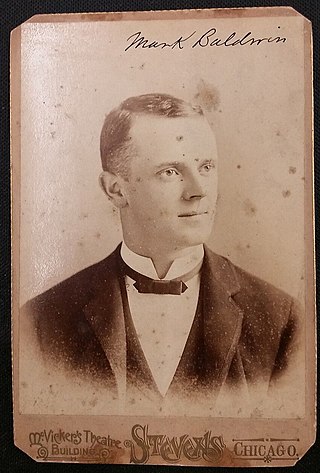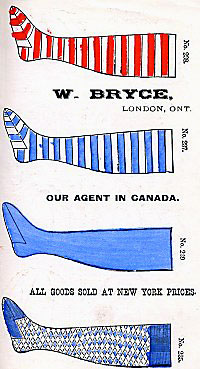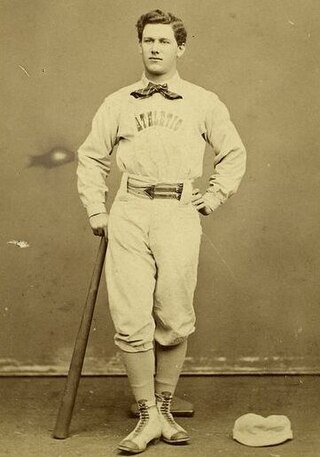Related Research Articles

Pittsfield is the largest city and the county seat of Berkshire County, Massachusetts, United States. It is the principal city of the Pittsfield, Massachusetts Metropolitan Statistical Area which encompasses all of Berkshire County. Pittsfield’s population was 43,927 at the 2020 census. Although its population has declined in recent decades, Pittsfield remains the third-largest municipality in Western Massachusetts, behind only Springfield and Chicopee.

Worcester Agricultural Fairgrounds was a 20-acre (8.1 ha) site in Worcester, Massachusetts, in the 19th century. The grounds are mainly known for having hosted the Worcester Worcesters, a professional baseball team of the National League from 1880 to 1882. As a major-league ballpark, the site is usually referred to as Agricultural County Fair Grounds or Worcester Driving Park.

Arthur Albert Irwin, nicknamed "Doc", "Sandy", "Cutrate" or "Foxy", was a Canadian-American shortstop and manager in Major League Baseball (MLB) during the late nineteenth century. He played regularly in the major leagues for eleven years, spending two of those seasons as a player-manager. He played on the 1884 Providence Grays team which won the first interleague series to decide the world champions of baseball. Irwin then served as a major league manager for several years.

Marcus Elmore Baldwin, nicknamed "Fido" and "Baldy", was an American right-handed professional baseball pitcher who played seven seasons in Major League Baseball (MLB). In 346 career games, he pitched to a 154–165 win–loss record with 295 complete games. Baldwin set the single-season MLB wild pitches record with 83 that still stands today.

The International Association for Professional Base Ball Players, commonly known as the International Association, was the name for two separate Canadian-American professional baseball leagues that first operated during 1877–1878 and later operated during 1888–1890.

The Troy Trojans were a Major League Baseball team in the National League for four seasons from 1879 to 1882. Their home games were played at Putnam Grounds (1879) and Haymakers' Grounds (1880–1881) in the upstate New York city of Troy, and at Troy Ball Clubs Grounds (1882) across the Hudson in Watervliet, or "West Troy" as it was known at the time.

Fredrick Elroy Goldsmith was a right-handed pitcher in 19th-century professional baseball in both the U.S. and Canada. In his prime, Goldsmith was six-foot-one-inch tall and weighed 195 pounds.

Timothy Hayes Murnane was an American sportswriter specializing in baseball, regarded as the leading baseball writer at The Boston Globe for about 30 years until his death. At the same time, he organized and led professional sports leagues and helped govern the baseball industry. He had been a professional baseball player, and played several seasons in the major leagues as a first baseman and center fielder.
Richard Simon Burns was an American professional baseball player from 1883 to 1890. He played three seasons in Major League Baseball, principally as a pitcher and outfielder, for the Detroit Wolverines, Cincinnati Outlaw Reds and St. Louis Maroons.

Ledell N. Titcomb, often erroneously referred to as Cannonball Titcomb, was an American professional baseball pitcher. He played for four major league teams from 1886 to 1890.

George Edward "Stump" Weidman was an American professional baseball player from 1880 to 1893. He played nine years in Major League Baseball, principally as a pitcher and outfielder, for five different major league clubs. He appeared in 379 major league games, 279 as a pitcher and 122 as an outfielder, and his longest stretches were with the Detroit Wolverines and the Kansas City Cowboys.

Michael Cornelius Dorgan was an American professional baseball player and manager. He played 10 seasons in Major League Baseball, principally as an outfielder, including five seasons and 425 games with the New York Giants from 1883 to 1887. He was also a player-manager for three major league clubs from 1879 to 1881.

Jeremiah F. "Jerry" Dorgan was an American professional baseball player from 1879 to 1887. He played four seasons of Major League Baseball as a right fielder and catcher for five major league clubs. He appeared in 131 major league games and compiled a .282 batting average with 22 doubles, four triples, no home runs and 49 RBIs.
The Pittsfield Red Sox was the name of an American minor league baseball franchise based in Pittsfield, Massachusetts, from 1965 through 1969. It was the Double-A Eastern League affiliate in the Boston Red Sox farm system and produced future Major League Baseball players such as George Scott, Sparky Lyle, Reggie Smith and Hall of Famer Carlton Fisk. The team played at Wahconah Park.

Charles W. Reipschlager, was a Major League Baseball catcher who played from 1883 to 1887 with the New York Metropolitans and the Cleveland Blues in the American Association. He batted and threw right-handed.

William J. Collins was an Irish professional baseball catcher. He played six seasons in pro baseball; four of those in Major League Baseball. He was born in Dublin, Ireland in 1863. Collins died on June 8, 1893, and was buried at Mount Olivet Cemetery in Maspeth, New York.
The Eastern Association was a minor league baseball league. The first version of the league appeared in 1882, followed by similar one season leagues in 1891 and 1909 with teams in Connecticut, New York, Pennsylvania and Rhode Island. The league was a Class B level league in the 1913 and 1914 seasons, with teams based in Connecticut and Massachusetts.

The 1879 Princeton Tigers football team represented the College of New Jersey, then more commonly known as Princeton College, in the 1879 college football season. The team finished with a 4–0–1 record and was retroactively named national champion by the Billingsley Report and National Championship Foundation and as co-national champion by Parke H. Davis. This season was Princeton's ninth national championship, and one of 11 in a 13-year period between 1869 and 1881. The team's captain was Bland Ballard.

The 1880 Princeton Tigers football team represented the College of New Jersey, then more commonly known as Princeton College, in the 1880 college football season. The team finished with a 4–0–1 record and was retroactively named co-national champion by the National Championship Foundation and Parke H. Davis. This season was Princeton's tenth national championship and one of 11 in a 13-year period between 1869 and 1881. The captain of the team was Francis Loney.
References
- ↑ "(untitled)". Boston Evening Transcript . March 22, 1879. p. 2. Retrieved October 16, 2022– via newspapers.com.
- ↑ "Base Ball Convention". The Pittsfield Sun. Pittsfield, Massachusetts. February 28, 1879. p. 1. Retrieved October 16, 2022– via newspapers.com.
- ↑ "1879 National Association". Baseball-Reference.com . Retrieved October 16, 2022.
- ↑ "The National Contest". The Boston Globe . October 5, 1879. p. 2. Retrieved October 16, 2022– via newspapers.com.
- ↑ "1880 National Association". Baseball-Reference.com . Retrieved October 16, 2022.
- ↑ "The Base Ball Season Opened". The Sun . New York City. May 2, 1880. p. 1. Retrieved October 16, 2022– via newspapers.com.
- ↑ "The New Hop Bitters Nine Admitted to the National Association". Democrat and Chronicle . Rochester, New York. June 6, 1880. p. 4. Retrieved October 16, 2022– via newspapers.com.
- ↑ "The National Championship". Brooklyn Daily Eagle . August 9, 1880. p. 3. Retrieved October 16, 2022– via newspapers.com.
- ↑ "Sports and Pastimes: Base Ball". Brooklyn Daily Eagle . September 3, 1880. p. 1. Retrieved October 16, 2022– via newspapers.com.